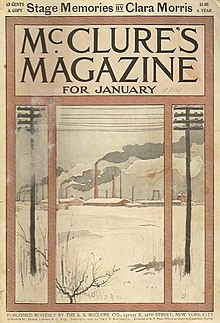
The muckrakers were reform-minded journalists, writers, and photographers in the Progressive Era in the United States (1890s–1920s) who claimed to expose corruption and wrongdoing in established institutions, often through sensationalist publications. The modern term generally references investigative journalism or watchdog journalism; investigative journalists in the US are occasionally called "muckrakers" informally.
The muckrakers played a highly visible role during the Progressive Era.[1] Muckraking magazines—notably McClure's of the publisher S. S. McClure—took on corporate monopolies and political machines, while trying to raise public awareness and anger at urban poverty, unsafe working conditions, prostitution, and child labor.[2] Most of the muckrakers wrote nonfiction, but fictional exposés often had a major impact, too, such as those by Upton Sinclair.[3]
In contemporary American usage, the term can refer to journalists or others who "dig deep for the facts" or, when used pejoratively, those who seek to cause scandal.[4][5] The term is a reference to a character in John Bunyan's classic Pilgrim's Progress, "the Man with the Muck-rake", who rejected salvation to focus on filth. It became popular after President Theodore Roosevelt referred to the character in a 1906 speech; Roosevelt acknowledged that "the men with the muck rakes are often indispensable to the well-being of society; but only if they know when to stop raking the muck."[4]
- ^ Filler, Louis (1976). The Muckrakers: New and Enlarged Edition of Crusaders for American Liberalism. University Park: Pennsylvania State University Press. pp. 361, 367–368, 372. ISBN 0-271-01212-9.
- ^ Herbert Shapiro, ed., The muckrakers and American society (Heath, 1968), contains representative samples as well as academic commentary.
- ^ Judson A. Grenier, "Muckraking the muckrakers: Upton Sinclair and his peers." In David R Colburn and Sandra Pozzetta, eds., Reform and Reformers in the Progressive Era (1983) pp: 71–92.
- ^ a b "'Muckraker: 2 Meanings", The New York Times, April 10, 1985.
- ^ Lapsansky-Werner, Emma J. United States History: Modern America, Boston, MA: Pearson Learning Solutions, 2011, p. 102.